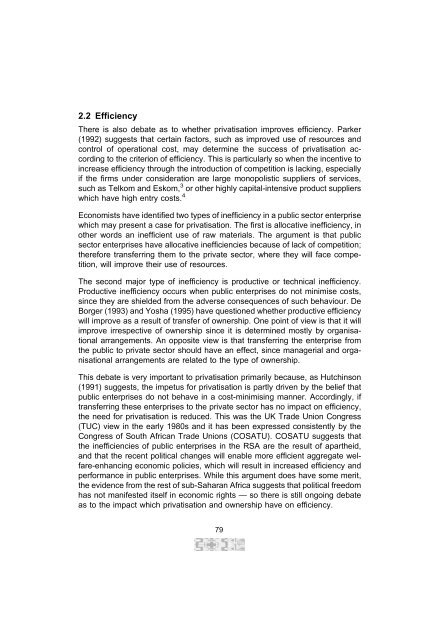AFRICANUS Vol 30 No 2 ISSN 0304-615X - University of South Africa
AFRICANUS Vol 30 No 2 ISSN 0304-615X - University of South Africa
AFRICANUS Vol 30 No 2 ISSN 0304-615X - University of South Africa
You also want an ePaper? Increase the reach of your titles
YUMPU automatically turns print PDFs into web optimized ePapers that Google loves.
2.2 Efficiency<br />
There is also debate as to whether privatisation improves efficiency. Parker<br />
(1992) suggests that certain factors, such as improved use <strong>of</strong> resources and<br />
control <strong>of</strong> operational cost, may determine the success <strong>of</strong> privatisation according<br />
to the criterion <strong>of</strong> efficiency. This is particularly so when the incentive to<br />
increase efficiency through the introduction <strong>of</strong> competition is lacking, especially<br />
if the firms under consideration are large monopolistic suppliers <strong>of</strong> services,<br />
such as Telkom and Eskom, 3 or other highly capital-intensive product suppliers<br />
which have high entry costs. 4<br />
Economists have identified two types <strong>of</strong> inefficiency in a public sector enterprise<br />
which may present a case for privatisation. The first is allocative inefficiency, in<br />
other words an inefficient use <strong>of</strong> raw materials. The argument is that public<br />
sector enterprises have allocative inefficiencies because <strong>of</strong> lack <strong>of</strong> competition;<br />
therefore transferring them to the private sector, where they will face competition,<br />
will improve their use <strong>of</strong> resources.<br />
The second major type <strong>of</strong> inefficiency is productive or technical inefficiency.<br />
Productive inefficiency occurs when public enterprises do not minimise costs,<br />
since they are shielded from the adverse consequences <strong>of</strong> such behaviour. De<br />
Borger (1993) and Yosha (1995) have questioned whether productive efficiency<br />
will improve as a result <strong>of</strong> transfer <strong>of</strong> ownership. One point <strong>of</strong> view is that it will<br />
improve irrespective <strong>of</strong> ownership since it is determined mostly by organisational<br />
arrangements. An opposite view is that transferring the enterprise from<br />
the public to private sector should have an effect, since managerial and organisational<br />
arrangements are related to the type <strong>of</strong> ownership.<br />
This debate is very important to privatisation primarily because, as Hutchinson<br />
(1991) suggests, the impetus for privatisation is partly driven by the belief that<br />
public enterprises do not behave in a cost-minimising manner. Accordingly, if<br />
transferring these enterprises to the private sector has no impact on efficiency,<br />
the need for privatisation is reduced. This was the UK Trade Union Congress<br />
(TUC) view in the early 1980s and it has been expressed consistently by the<br />
Congress <strong>of</strong> <strong>South</strong> <strong>Africa</strong>n Trade Unions (COSATU). COSATU suggests that<br />
the inefficiencies <strong>of</strong> public enterprises in the RSA are the result <strong>of</strong> apartheid,<br />
and that the recent political changes will enable more efficient aggregate welfare-enhancing<br />
economic policies, which will result in increased efficiency and<br />
performance in public enterprises. While this argument does have some merit,<br />
the evidence from the rest <strong>of</strong> sub-Saharan <strong>Africa</strong> suggests that political freedom<br />
has not manifested itself in economic rights Ð so there is still ongoing debate<br />
as to the impact which privatisation and ownership have on efficiency.<br />
79
















